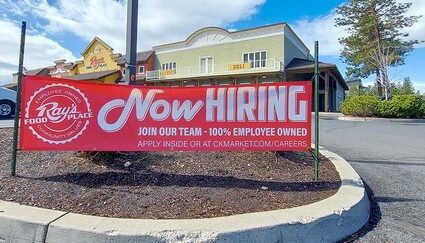Worker shortage causing woes
Last updated 5/4/2021 at Noon

Bill Bartlett
Businesses of all types in Sisters are struggling to fill job openings. Some are offering signing bonuses.
There are plenty of job openings in Sisters. The lack of applicants is reaching critical proportions for area businesses, however. Help Wanted signs appear all over town and in The Nugget there have been multiple ads in the classified section for a range of jobs. Some employers have taken to running color ads in the main news section of the paper in hopes of drawing even more notice.
The problem has been building for a year and the reasons are numerous. The best illustration is probably McDonald’s, where crew shortages have caused a reduction in operating hours — notwithstanding last week’s order from the Governor closing indoor dining again for at least two weeks, McDonald’s has not been adequately staffed for several months to serve diners in their dining room or for walk-in takeout. Only the drive-thru is open.
McDonald’s is synonymous with entry-level jobs where millions of students have traditionally learned job skills while earning for college, their first car, or to help with the family budget. Despite the local McDonald’s offering up to $18.25 per hour, $6 more than the current state minimum wage, plus a retention bonus of $1,000, hire-a-friend bonus of $750, and up to $3,000 in tuition assistance, Sisters McDonald’s has been short-handed for nearly a year.
The first problem for all Sisters employers for jobs under $25 per hour is a small labor pool. Sisters Country population is dominated by retirees and empty nesters, even as our schools are adding students. Affluence in the community is a negative when attracting employment with starting wages. The median income for ZIP code 97759 is $76,012. In Redmond, where the majority of our workers reside, it is $65,788 and the median age is 39.7 vs. 53.7 for Sisters.
Skilled labor shortages are equally distressing. As recently as two years ago a new custom home could be built in Sisters in five or six months. Now it takes nine months or longer to finish a house. Some of that is material shortages, but for the most part, it is a lack of workers.
Mike Davis, a framing contractor, blames a big chunk of the problem on cultural shifts.
“For the last two decades educational focus has been on a four-year college degree, with almost zero investment or policy interest in vocational schools,” he said.
He opines that the same system unintentionally stigmatizes working with one’s hands or building things.
“Kids with a degree today would rather be a bank teller for $18 an hour than sling a hammer for $25 or $30,” he said.
Apprentice electricians can earn $40 to $50 per hour, and still there are shortages reported by the Oregon Association of Building Contractors. Appliance repair technicians who can make $80,000-$100,000 per year are scarce as well. You learn that when your dishwasher goes kaput and you have to wait weeks for service.
Similarly, McDonald’s finds itself competing for workers due to the changing image in the fast-food industry. Starbucks has no shortage of workers earning similar pay as the cachet of being a barista outranks flipping burgers. The dated, albeit iconic uniforms worn by generations of McDonald’s workers have been replaced with trendy tee shirts and flattering pants, yet that’s done little to move the needle.
The Lodge in Sisters offers a $500 signing bonus as a recruitment incentive. FivePine Lodge & Conference Center provides a $150 monthly bonus for full-time employees, plus membership to Sisters Athletic Club, to induce applicants. Another Sisters employer provides $50 to $100 monthly merchandise gift cards for store workers in her shop to retain them.
Rising gas prices, up 60 cents per gallon since January, further exacerbate the issue for Redmond workers calculating the cost of commuting to Sisters — even more the case driving from Bend.
Ray’s Food Place is in urgent need of workers to fill some 20 openings, not just for cashiers and clerical positions but also better-paying jobs like butchers.
The pandemic has had a major impact on hiring. Some workers are leery of returning to work, citing increased health risks of being in the workplace. Others are forced to stay home to care for school-aged children as the return to full-time, in-person learning has been circuitous. The majority of employers cite as the overwhelming cause being the unintended consequences of congressional actions that pay some people more to stay home than go to work.
The original $600 per week added federal-unemployment benefit has been lowered to $300 until September 6.* If you were working for $15/hour ($31,200/year) pre-pandemic, Oregon pays you $390 per week plus the federal add-on of $300, and that works out to $35,880 per year. It’s hard to blame lower paid, entry-level workers for taking advantage of the inverse incentive.
Downstream, the problem is compounded. At the same time the State is paying record unemployment claims to remain-at-home workers, those same workers are not having income taxes withheld from paychecks. In a State with no sales tax, only income taxes, a budget shortfall of up to $1.6 billion is projected.
As local employers lament, there appears no end in sight to the problem.
* This story has been edited to reflect the correct end date of additional federal unemployment benefits.

















Reader Comments(0)